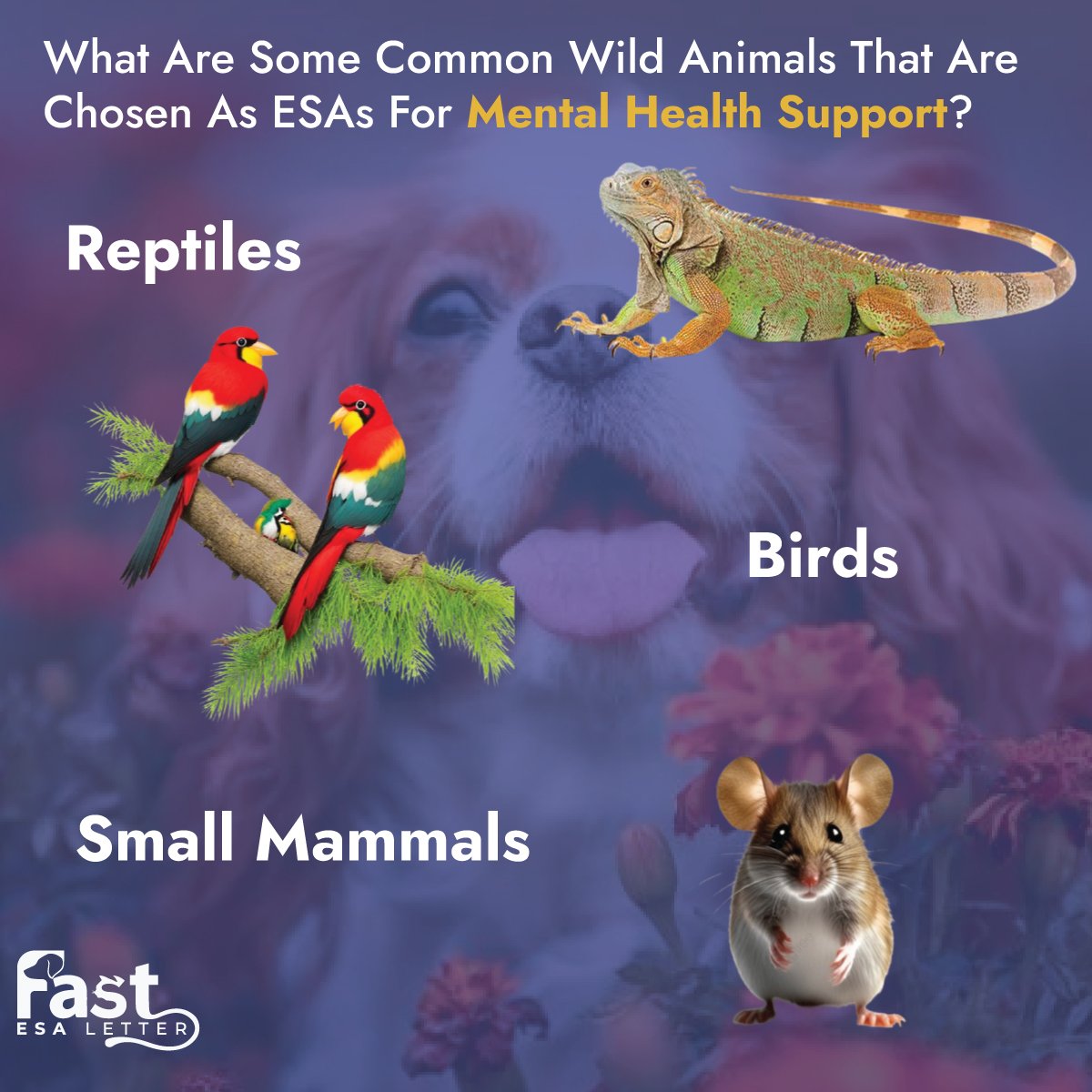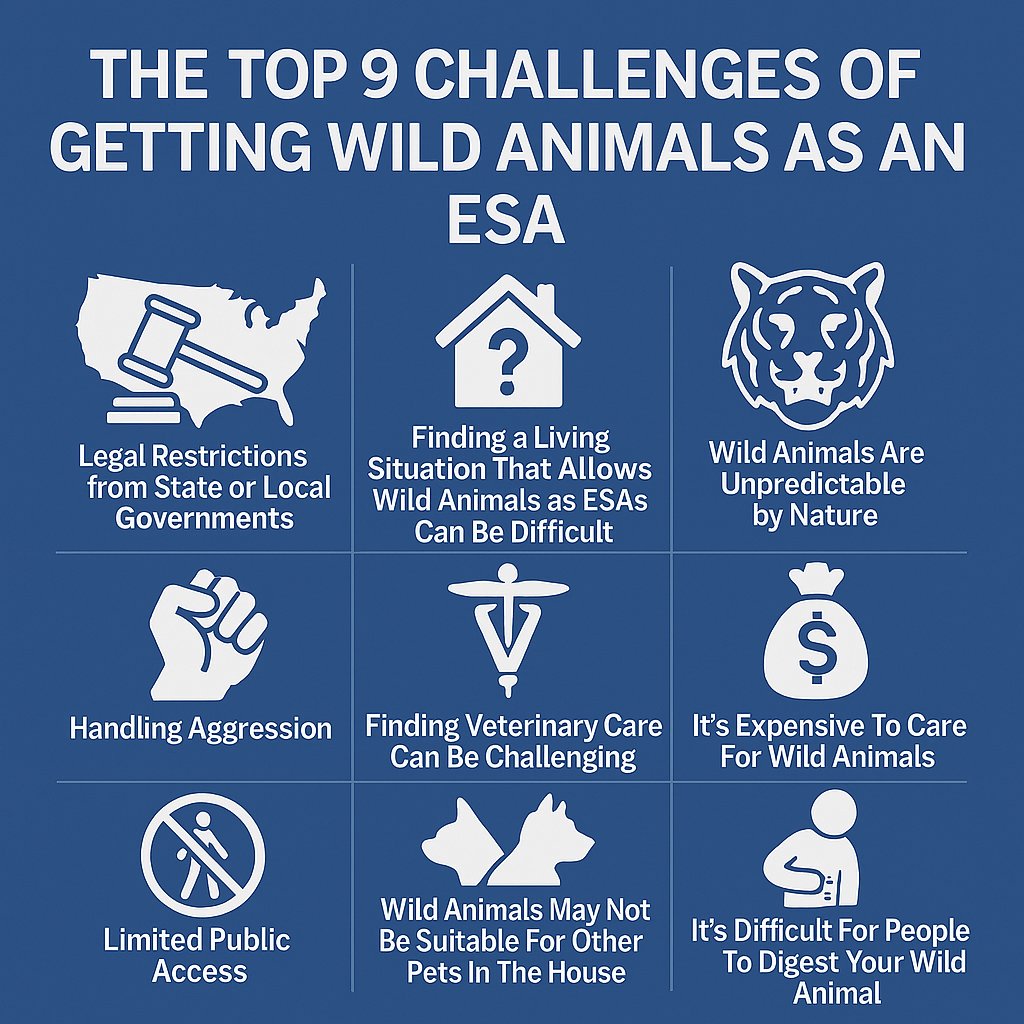Choosing a Wild Animal as Your Emotional Support Animal.

Robert Clendenin, MD
Unlike a service animal, which is trained to perform specific tasks for individuals with disabilities, emotional support animals do not require specialized training.Therapy animals also play a distinct role compared to ESAs, providing mental health support in settings like hospitals and schools, but they are governed by different rights and regulations.So, is it really possible to have a wild animal as an emotional support animal? If so, what factors should you consider before making such a significant decision? In this blog post, we will discuss how wild animals can provide mental health support, the challenges involved, and important factors to consider.

Can Wild Animals Be Emotional Support Animals?
Any animal that provides emotional support can be classified as an emotional support animal (ESA), including wild species. However, wild animals may require additional permits to be kept legally depending on the state.Local, state, and federal regulations often restrict the ownership of certain species for safety and conservation reasons. For instance, exotic pets like large cats, primates, or venomous reptiles might be prohibited or require special licenses.
What Are Some Common Wild Animals That Are Chosen As ESAs For Mental Health Support?

- Reptiles: Some people choose reptiles like snakes (e.g., corn snakes, ball pythons) or lizards (e.g., bearded dragons, leopard geckos) as ESAs.
- Birds: Birds, especially larger species like parrots (e.g., African greys, macaws) and cockatoos, are often chosen for their social and affectionate behaviors.
- Small Mammals: Animals like ferrets or hamsters may also be considered as ESAs. These small mammals are often playful, curious, and interactive, providing companionship and emotional support.
The Top 9 Challenges of Getting Wild Animals as an ESA
1. Legal Restrictions From State or Local Governments
2. Finding a Living Situation That Allows Wild Animals as ESAs Can Be Difficult
3. Wild Animals Are Unpredictable by Nature

4. Handling Aggression
5. Finding Veterinary Care Can Be Challenging
6. It’s Expensive To Care For Wild Animals
7. Limited Public Access
8. Wild Animals May Not Be Suitable For Other Pets In The House.
9. It’s Difficult For People To Digest Your Wild Animal
What Are the Benefits of Wild Animals as Emotional Support Animals?
Unlike domesticated pets, which may become accustomed to their surroundings, wild animals often require a more dynamic environment to thrive. This can lead to a constant stream of surprises and challenges, keeping your mind engaged and active.
Additionally, interacting with a wild animal can foster a deeper connection to nature. As you learn about the animal’s natural habitat, behaviors, and role in the ecosystem, you may develop a greater appreciation for the natural world.
How to Get an ESA Letter For a Wild Animal?
Do Wild Animals Require Special Training to Be ESAs?
Top 5 Things to Consider When Choosing a Wild Animal As An ESA.
1. Research Specific Laws and Ordinances
Before acquiring a wild animal as an ESA, it is crucial to research the local laws and regulations that pertain to wild animal ownership. Some jurisdictions have specific restrictions on certain species.
2. Understanding Animal Behavior
3. Species-Specific Vocalizations
4. Space and Habitat Requirements
5. Daily Care Requirements
Why Consider Alternatives to Wild Animals as Emotional Support Animals?
What Are the Best Alternatives to Wild Animals for Emotional Support?
The most common and effective ESAs are dogs and cats, which offer companionship, comfort, and emotional stability to their owners. Other popular best emotional support animal alternatives include:
- Rabbits: Gentle and easy to care for, rabbits are affectionate and quiet animals.
- Guinea pigs: These small pets are friendly, low-maintenance, and thrive on human interaction.
- Birds: Parrots, cockatiels, and other birds can be highly sociable and bond closely with their owners.
- Miniature horses: Though less common, miniature horses are intelligent and can provide significant emotional support.
Is Choosing a Wild Animal as Your ESA Right for You?
If you’re choosing wild animals as your ESA, consider their temperament, size, and lifestyle. Remember, not every animal is your best emotional support animal. For most individuals, a domesticated animal is a safer and more manageable option.
Frequently Asked Questions (FAQs)
Can My Wild Animal ESA Travel With Me?
Can I Bring My Wild Animal ESA To Public Places?
Access for ESAs in public spaces is generally restricted, especially for wild animals. Many public venues, including restaurants, stores, and public transportation, do not permit wild animals due to safety concerns, hygiene issues, and local laws.
Can Any Wild Animal Be An ESA?
Can I Have Exotic Animals As Emotional Support Pets?
How Do Wild Animals Serve As Emotional Therapy Pets?
Do I Need An ESA Letter For Exotic Pets?
What Are The Therapeutic Benefits Of Wild Animals As Emotional Support Companions?
Do Dogs Offer More Mental Health Benefits Compared To Wild Animals?
Can Emotional Support Animals Be Treated the Same as Service Animals Under the Law?
How Can I Benefit From Mental Health Support With Wild Animals?
Post Author
Prince Sharma
Related Articles
Can a Turtle Be an Emotional Support Animal?
Can a Turtle Be an Emotional Support Animal? Yes—Here’s How!Yes, a turtle can be an emotional support animal (ESA) if it provides comfort and emotional stability to its owner. While turtles may not offer the same level of interaction as dogs or cats,...
Is a Fox Terrier the Right Emotional Support Dog for You?
Is a Fox Terrier the Right Emotional Support Dog for You?Fox Terriers can be your perfect emotional support animal, offering unmatched comfort and companionship if you're dealing with emotional or mental health challenges. To officially make your Fox...
Can Your Tenant Own an Alligator as an Emotional Support Animal?
Can Your Tenant Own an Alligator as an Emotional Support Animal?Yes, an alligator can become an emotional support animal (ESA) if a licensed professional provides an ESA letter. However, due to safety concerns, many landlords and states may restrict...
Live Free with Your ESA!
An ESA Letter Unlocks Freedom!





